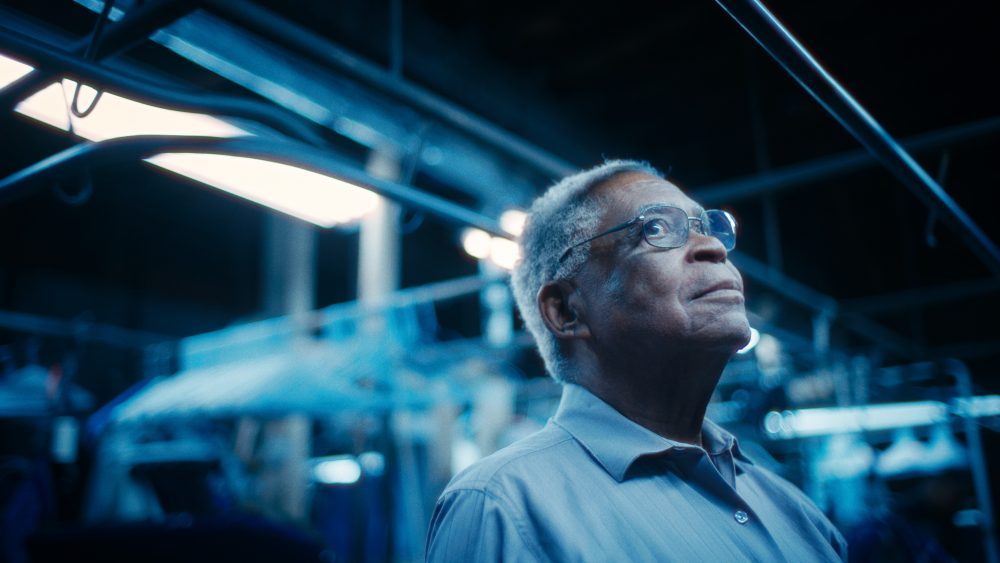Sometimes if you ask a simple question, it leads to a not-so-simple answer about why Black Lives Matter.
Horace Bowers, then 91, and a survivor of the Jim Crow era, puts the conversation in motion when he asks his grandson, composer-pianist Kris Bowers, “What’s a concerto?”
The exchange occurs on the eve of the younger Bowers’ debut of “For a Younger Self,” a violin concerto that received its world premiere in February 2020 at Disney Concert Hall in Los Angeles. The discussion also provides the framework of the short documentary “A Concerto Is a Conservation,” screened at Sundance and regarded as a short-list candidate for this year’s Academy Awards.
To his grandfather’s question, Kris explains that a concerto consists of “two elements, a soloist and orchestra, having a conversation.” From there, he and Horace start their own dialogue, reflecting on how one man’s determination can change a family’s fate and how that experience stands as a testament to a nation’s original sin. “It all goes back to slavery,” Horace reminds his grandson.
In its compact 13 minutes, “A Concerto Is a Conversation” manages to say more about race relations than a film that runs 10 times as long.
Bowers, whose credits include the series “Bridgerton” and “When They See Us,” not only serves as subject, he also directed it with writer/producer Ben Proudfoot. A winner at age 21 of the Thelonious Monk Jazz Piano Competition Award in 2011, Bowers wrote the score for “Green Book” (2018) and doubled in close-up shots for Mahershala Ali as piano great Don Shirley.
With its direct statements of fact and skillful use of archival and contemporary footage, “A Concerto Is a Conversation” indicts a post-George Floyd political landscape. Horace Bowers relates anecdotes from decades ago that likely would unfold in the same way today, such as being refused for a loan because of one’s skin color. As a teenager, Horace fled Florida, where he witnessed daily indignities and insults, such as whites calling his father a boy. “That stuck with me forever. … I knew I was going to leave there. I didn’t want no part of that part of the country.”
Hitchhiking across the USA (which he admits, “I had to be crazy”) in the ’40s, he decided on Los Angeles, where he eventually built a dry-cleaning empire. “I never heard of L.A. before,” he said. “I didn’t know how I was going to make it, but I knew I was going to make it.”
Kris points out that his grandfather was just 20 years old when he became an entrepreneur. “In two years, he went from being homeless to being in business.”
Even out of the South, racism remained a factor. “I realized that in the South, they tell you. In L.A., they show you. … But you got to know, you cannot stop me.” Captured in the direct-to-film, Interrotron style of Errol Morris, these admissions take on an even greater impact.
The younger Bowers credits his grandfather’s determination as a motivating factor in his own career. Even though as a graduate of the prestigious Colburn and Juilliard schools, Kris Bowers has struggled to find a sense of belonging in the white-dominated worlds of classical and film music. “I’m very aware that I’m a Black composer, and sometimes I get the feeling I’m not supposed to be in the spaces I’m in or not supposed to have gotten to the places I’ve gotten to.”
His grandfather reminds him, “Never think that you’re not supposed to be there, because you wouldn’t be there if you weren’t supposed to be there.”
Though that might seem like a simple answer, it’s a complex and powerful assessment of one man’s resolve. Despite the obstacles of systemic racism, Horace Bowers opened a door of opportunity not only for himself, but also for subsequent generations, and through his guidance and wisdom, he continues to inspire. For his family and the rest of a divided nation, that’s a “Conversation” definitely worth having.











